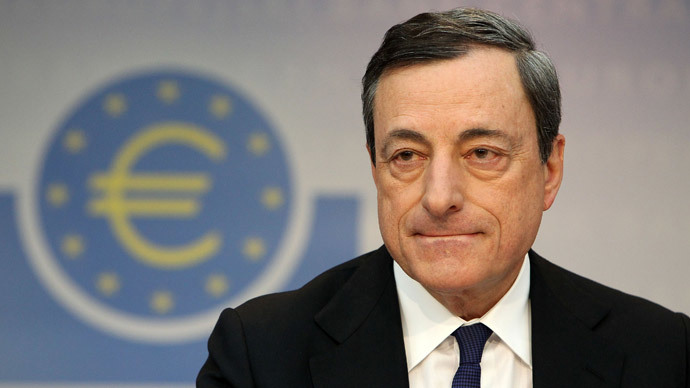Euro-Catch 22: Mario Draghi’s woes over QE

Not only is the eurozone economy festering, even the ultimate in Quantitative Easing may prove an entirely poisoned chalice.
A tricky financial problem has arisen which is so surreal that if we are not careful we could be swept up in a certain spirit of sympathy for the banking genre. At its core we have a suave, debonair, elegant hero.
However, while being perhaps the Central banking answer to Marcello Mastroianni, sympathy may fade upon recalling that this man has worked for the great vampire squid itself, Goldman Sachs. Nevertheless, ECB President Mario Draghi is an urbane figure who sits at the epicenter of this fascinating financial morality play.
Amongst his notable outbursts, Draghi famously remarked that he was willing to do “whatever it takes” to save the euro. This appeared to work magic on investors, who often seem spellbound when central bankers speak their hocus pocus and deliver alleged miracle cures which often appear like bald quackery.
Central bankers wear their superiority complexes with a certain panache. This is, in itself, rather at odds with their achievements. The latest banking crisis was hardly helped by their running a multi-year fiesta of low interest rates – akin to pushing partygoers’ heads into the punchbowl to help them ingest more booze.
Central bankers’ cure for the post 2008 hangover was a more powerful stimulant to the already heady cocktail: Quantitative Easing; that odd phrase which basically means printing money.
While popular overseas, eurozone QE was restricted to some technical programs, modest nuggets of ‘funny money’ lest German sensibilities were upset. Teutonic DNA remains traumatized by the horrific hyperinflation as the Weimar Republic melted down, paving the way for the Third Reich.
Nowadays, given the fundamental flaws of the Euro (a currency without an underlying political system to ensure fiscal responsibility), the fact that the Euro still exists at all, is a tribute to Draghi’s innate talent...or sheer bloody mindedness (“whatever it takes”). However, now Draghi’s marvelous bravado leaves him with a fascinating, and frightening, dilemma.

Last week ‘Super Mario’ (the financial press fawn over central bankers with a certain ironic gusto) emerged from an ECB Council meeting to announce that finally the ECB was edging towards perhaps deploying a full QE program.
As Britain, America and even Japan, amongst others, printed money with alacrity, the euro has, despite its broad range of fundamental maladies, actually increased in value! This has impacted on Europe’s export competitiveness, at a time when nations like Greece and Spain are still teetering somewhat on the cusp of economic survival. Therefore, faced with an overvalued currency, 12 percent average unemployment and, at best, economic stagnancy...well maybe it is time to do “whatever it takes.”
So is Mario Draghi’s finger poised over the red button to activate the money printing presses?
Actually, Super Mario faces an incredible dilemma - damned if he does and damned if he doesn’t. To work, QE must trickle into the real economy. Even in UK/US schemes, often the cash has remained stubbornly within the investment world chasing paper assets as opposed to invigorating the manufacturing and service economy.
Within the EU the problem is not just this trickle down aspect. Rather vital issues with the banks themselves have not been addressed. Put simply: the political class remain in denial at the extent of banks’ problems. Many EU banks may fail the autumn round of stress tests. Gutless eurozone governments have palpably failed to take control of the economic situation, wrapping bandages around vast festering wounds.
Thus throughout the eurozone, there are many zombie banks, de facto insolvent entities being protected by stubborn (scared) politicians. These walking dead institutions are not merely in the depressed Mediterranean nations with rampant unemployment, they even exist in Angela Merkel’s otherwise prosperous German hinterlands. Given how she has sought to ‘punish’ incompetent governments, her hypocrisy in punishing other citizens (e.g. in Ireland) to protect her banks is rather incredible. It also threatens the long-term survival of the euro, let alone the EU.
Mario Draghi faces a genuine Catch-22 situation. If he launches QE it may reduce the euro in value, but at the same time, even by the standards of QE, his ability to pump prime the economy through a trickle-down effect through the banking system is very modest. A massive tsunami of freshly minted euro might simply end up propping up zombie banks which need to be closed.
Pity the poor banker, for whatever he does.
The statements, views and opinions expressed in this column are solely those of the author and do not necessarily represent those of RT.
The statements, views and opinions expressed in this column are solely those of the author and do not necessarily represent those of RT.













